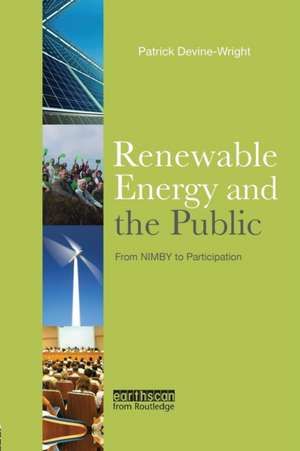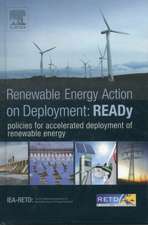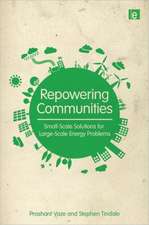Renewable Energy and the Public: From NIMBY to Participation
Editat de Patrick Devine-Wrighten Limba Engleză Paperback – 26 noi 2015
This volume provides a timely, international review of research on public engagement, in contexts of diverse, innovative energy technologies. Public engagement is conceived broadly - as the interaction between how developers and other key actors engage with publics about energy technologies (including assumptions held about the methods used, such as the provision of financial benefits or the holding of deliberative events), and how individuals and groups engage with energy policies and projects (including indirectly through the media and directly through emotional and behavioural responses).
The book's contributors are leading experts in the UK, Europe, North and South America and Australia drawn from a variety of relevant social science disciplinary perspectives. The book makes a significant contribution to our existing knowledge, as well as providing interested professionals, policymakers and members of the public with a timely overview of the critical issues involved in public engagement with low carbon energy technologies.
| Toate formatele și edițiile | Preț | Express |
|---|---|---|
| Paperback (1) | 436.14 lei 6-8 săpt. | |
| Taylor & Francis – 26 noi 2015 | 436.14 lei 6-8 săpt. | |
| Hardback (1) | 768.30 lei 6-8 săpt. | |
| Taylor & Francis – 3 noi 2010 | 768.30 lei 6-8 săpt. |
Preț: 436.14 lei
Nou
Puncte Express: 654
Preț estimativ în valută:
83.45€ • 87.14$ • 68.91£
83.45€ • 87.14$ • 68.91£
Carte tipărită la comandă
Livrare economică 15-29 aprilie
Preluare comenzi: 021 569.72.76
Specificații
ISBN-13: 9781138985131
ISBN-10: 1138985139
Pagini: 368
Dimensiuni: 156 x 234 x 20 mm
Greutate: 0.45 kg
Ediția:1
Editura: Taylor & Francis
Colecția Routledge
Locul publicării:Oxford, United Kingdom
ISBN-10: 1138985139
Pagini: 368
Dimensiuni: 156 x 234 x 20 mm
Greutate: 0.45 kg
Ediția:1
Editura: Taylor & Francis
Colecția Routledge
Locul publicării:Oxford, United Kingdom
Cuprins
Introduction (Patrick Devine-Wright, University of Exeter, UK)Section 1: Conceptual approaches 1.Symmetries, expectations, dynamics and contexts: a framework for understanding public engagement with renewable energy projects (Walker, University of Lancaster, UK, and colleagues)2.The principles, procedures, and pitfalls of public engagement in decision-making about renewable energy (Haggett, University of Edinburgh, UK)3.Beyond consensus? Agonism, republicanism and a low carbon future (Barry and Ellis, Queens' University, Belfast, N. Ireland)4.Public roles and socio-technical configurations: diversity in renewable energy deployment in the UK and its implications (Walker and Cass, University of Lancaster, UK)5.From Backyards to Places: Public engagement and the emplacement of renewable energy technologies (Patrick Devine-Wright, University of Exeter, UK)Section 2: Empirical studies of public engagementPart 1: Stakeholder and media representations of public engagement6.Discourses on the implementation of wind power: Stakeholder views on public engagement (Wolsink, University of Amsterdam, Netherlands)7.Governing the Reconfiguration of Energy in Greater London: Practical Public Engagement as 'Delivery' (Hodson and Marvin, University of Salford, UK)8.Envisioning public engagement with renewable energy: an empirical analysis of images within the UK National Press 2006/7 (Hannah Devine-Wright, University of Manchester, UK)9.NIMBYism and community consultation in electricity transmission network planning (Cotton and Patrick Devine-Wright, University of Exeter, UK)Part 2: Case studies of public beliefs and responses Future energy scenarios10.Turning the heat on: Public engagement in Australia's energy future (Ashworth, Littleboy, Graham & Niemeyer, Commonwealth Scientific and Industrial Research Organisation, Australia)Solar energy and microgeneration11.Shaping people's engagement with microgeneration technology: the case of solar photovoltaics in UK homes (Abi-Ghanem, Imperial College London and Haggett, University of Edinburgh, UK)12.Siting Solar Power in Arizona: A Public Value Failure? (Pasqualetti and Schwartz, Arizona State University, USA)13.Socio-Environmental Research on Energy Sustainable Communities: Participation Experiences of Two Decades (Schweizer-Ries, University of Saarland, Germany)14.Yes in my back yard: UK householders pioneering microgeneration heat (Roy and Caird and Roy, Open University, UK)Wind energy15.Socio-environmental impacts of Brazil's first large-scale wind farm (Improta and Pinheiro, Federal University of Rio Grande do Norte, Natal, Brazil)16.Perceptions and Preferences Regarding Offshore Wind Power in the United States - The Leading Edge of a New Energy Source for the Americas (Firestone, University of Delaware, USA)Hydrogen energy:17.The limits of upstream engagement in an emergent technology: lay perceptions of hydrogen energy technologies (Flynn, Bellaby and Ricci, University of Salford, UK)18.Public engagement with wind-hydrogen energy technology: a comparative study (Sherry-Brennan, Devine-Wright and Devine-Wright, University of Exeter, UK)Marine energy19.Symbolic interpretations of wave energy in the UK: surfers' perspectives (McLachlan, University of Manchester, UK)Bioenergy20.Heat and light: understanding bioenergy siting controversy (Upham, University of Manchester, UK)Nuclear and low carbon energy21.From the Material to the Imagined: Public Engagement with Low Carbon Technologies in a Nuclear Community (Butler, Parkhill and Pidgeon, Cardiff University, Wales, UK)Conclusions (Devine-Wright, University of Exeter, UK)
Notă biografică
Prof. Devine-Wright researches social and psychological aspects of new energy infrastructure such as wind farms, drawing on the concepts of place attachment and place identity to explain 'NIMBY' responses. He is based at the University of Exeter, UK.
Recenzii
'Public acceptance is key to the development of the renewable energy we need to meet our climate goals. Simple stereotypes of NIMBY opposition may work in newspaper headlines, but developers and policymakers need a more sophisticated understanding of what makes people tick and how best to engage. This new volume meets a pressing need - both academics and practitioners will gain from it.' Prof Jim Skea, Research Director, UK Energy Research Centre 'This book provides a broad survey of public perceptions and community reactions to building new low-carbon energy facilities. The chapters treat community resistance (and support) as systematic phenomena to be scientifically studied, opening possibilities for creative action. This is a welcome antidote to the typical reaction by engineers and project developers, treating public opinion as an immutable black box.' Prof. Willett Kempton, Center for Carbon-free Power Integration, University of Delaware, USA 'Extensive research has been done over the last decades on both mitigation and adaptation to climate change in the built environment, but the outputs of much of this research have failed to result in the wider uptake of effective greenhouse gas emission reduction solutions. This book introduces 'fresh thinking' on how this may be done- with chapters from leading experts in fields ranging from philosophy, the social, political and physical sciences, engineering, architecture, mathematics and complexity science.' Renew Magazine
'Patrick Devine-Wright's Renewable Energy and the Public: From NIMBY to Participation takes a broad, multidisciplinary approach to the issue of public engagement for renewable energy products. A multitude of contributors offer a variety of theoretical and empirical analyses of the issue, all of which support Devine-Wright's core argument that traditional means of conceptualizing public and stakeholder positions on renewable energy are overly simplistic, and public engagement processes based on these depictions are insufficient for pursuing the goal of increased renewable energy use in a fair and democratic way.' - Damian Pitt, Journal of Planning Education and Research
'Patrick Devine-Wright's Renewable Energy and the Public: From NIMBY to Participation takes a broad, multidisciplinary approach to the issue of public engagement for renewable energy products. A multitude of contributors offer a variety of theoretical and empirical analyses of the issue, all of which support Devine-Wright's core argument that traditional means of conceptualizing public and stakeholder positions on renewable energy are overly simplistic, and public engagement processes based on these depictions are insufficient for pursuing the goal of increased renewable energy use in a fair and democratic way.' - Damian Pitt, Journal of Planning Education and Research


















